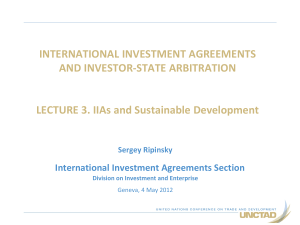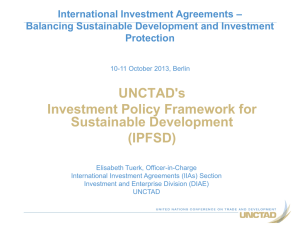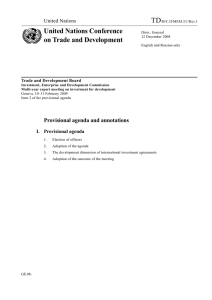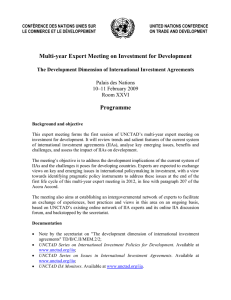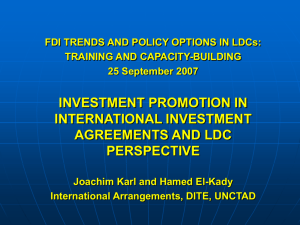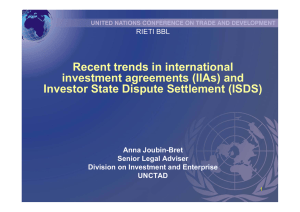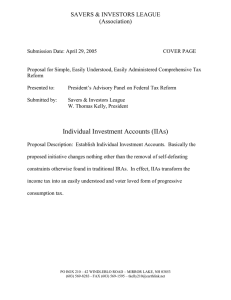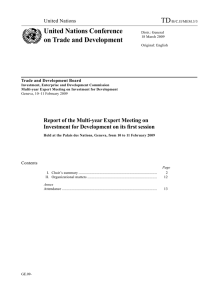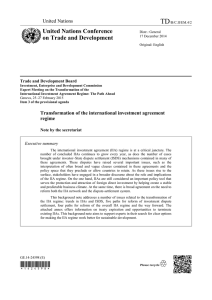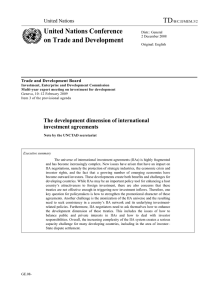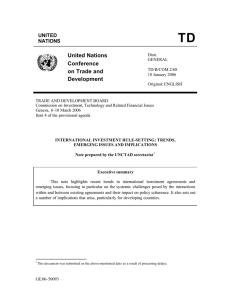Other IIAs
advertisement
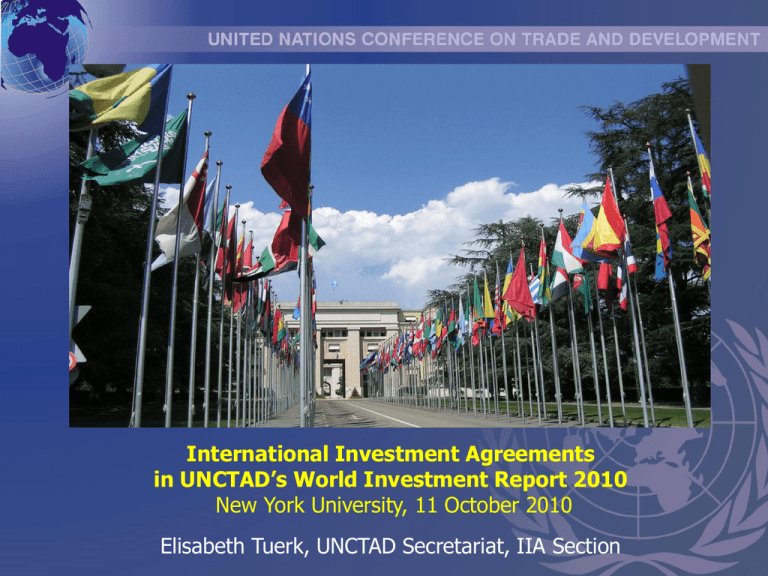
International Investment Agreements in UNCTAD’s World Investment Report 2010 New York University, 11 October 2010 Elisabeth Tuerk, UNCTAD Secretariat, IIA Section UNCTAD Division on Investment & Enterprise – DIAE Flagships World Investment Forum (WIF): Accra, Ghana (2008) Xiamen, China (2010) Doha, Qatar (2012) World Investment Report (WIR): 2010 20th Anniversary Edition: “Investing in a low-carbon Economy” Earlier topics included: - Agriculture (2009) - Infrastructure Challenges (2007) - Internationalization of Research & Development (2005) - Services (2004) UNCTAD World Investment Forum 2010 Xiamen, China UNCTAD World Investment Forum 2010 Xiamen, China • 1,800 participants 120 countries & 16 international organizations: 9 heads of states, 4 heads of IOs, 79 ministerial-level officials, 116 senior business executives & > 250 other senior representatives from public & private sector • Key meetings - World Leaders Investment Summit - Ministerial Round Table - Investment Advisory Council - High Level Tripartite Conference - International Investment Agreements Conference - Sustainable Stock Exchanges - Investment Showcases UNCTAD World Investment Report 2010 Table of Content: - Chapter I: Global Trends in FDI - Chapter II: Regional Trends in FDI - Chapter III: Recent Policy Developments - Chapter IV: Leveraging Foreign Investment for a lowcarbon Economy - Epilogue National Policy Developments National regulatory changes, 1992-2009 (per cent) Source: UNCTAD database on national law and regulations International Investment Policies: 2009 Trends The IIA Regime: 2009 Developments Trends of BITs, DTTs & other IIAs Source: UNCTAD, based on IIA database IIA Regime: 2009 Developments • In 2009, 211 new concluded IIAs - 82 bilateral investment treaties (BITs) - 109 double taxation treaties (DTTs) - 20 IIAs other than BITs and DTTs. • On average about 4 new agreements per week • End of 2009: total of 5,939 IIAs: - 2,750 BITs - 2,894 DTTs - 295 other IIAs • South-South dimension: 19 of the 82 BITs between developing countries, 4 DTTs & 8 other IIAs. BITs & Other IIAs: Trends in Rule-making BITs: • Mostly post-establishment & protection; • A few: pre-establishment rights (e.g. Canadian BITs); • New features to rebalance rights & obligations; Other IIAs: • Substantive investment chapters w. provisions usually found in BITs; • Limited investment-related provisions (market access/establishment); • Cooperation, e.g. creation of a consultative committee or a institutional arrangements; Other Developments 2009: EU • Lisbon Treaty: certain competences for FDI were transferred from member States to the European Union. • European Court of Justice: certain BITs of three member States (Austria, Finland and Sweden) violated the European Community Treaty. • July 2010: - Communication entitled “Towards a comprehensive European international investment policy”, COM (2010) 343 final - Proposal for Regulations, COM (2010) 344 final ISDS: 2009 Developments 50 400 45 350 40 300 35 30 250 25 200 20 150 15 100 10 5 50 0 0 2009 All cases cumulative 2008 2007 2006 2005 Source: UNCTAD, ISDS database 2004 Non-ICSID 2003 2002 2001 2000 1999 1998 1997 1996 1995 1994 1993 1992 1991 1990 1989 ICSID Cumulative number of cases Annual number of cases Known investment treaty arbitrations (1989-2009) ISDS: 2009 Developments • With 32 new initiated ISDS cases in 2009 the total raises to 357 cases; • ICSID most frequently used: 225 cases; • 81 countries involved in ISDS (end of 2009): - 49 developing countries - 17 developed countries - 15 economies in transition • 44 decisions have been rendered in 2009, raising the total number of concluded cases to 164; Systemic Evolution & Transformations of the IIA Regime Systemic Evolution of the IIA Regime - Review of model BITs - Termination of IIAs - Renegotiation of BITs - Modernizing treaty content - Developments in the ISDS system Model BITs • Review process concluded: Russian Federation, France, Colombia, Mexico, Austria & Germany • Review process under way: Argentina, Venezuela, Ecuador, Morocco, Bolivia, South Africa, Turkey, United States • Reasons for review: - establish clearer rules ensure consistency w. public interest seek balance: investor & host country adjust model to new developments Termination of IIAs • Ecuador: Jan 2008: intention to withdraw: Cuba, Dom Rep, El Salvador, Guatemala, Honduras, Nicaragua, Paraguay, Romania, Uruguay • Ecuadorian Constitutional Court: 4 BITs unconstitutional (ISDS; Germany, China, Finland & United Kingdom) • Ecuador: withdrew from ICSID Convention • Bolivia: ICSID withdrawal, renegotiation of BIT w. Netherlands • Russian Federation: official notification of its intension not to become Contracting Party of Energy Charter Treaty (ECT) Renegotiation of BITs • 19 BITs were renegotiated in 2009 = 1/4 of concluded BIT • Czech Republic is the most active country (15 renegotiated BIT accession to the EU) • Several BITs have been replaced by broader economic agreements with a BIT-like chapter • Renegotiation on regional level: ASEAN replaced its investment agreement by the ASEAN Comprehensive Investment Agreement in 2009 Modernizing Treaty Content • Clarifying the scope of the treaty • Introducing general exceptions that allow more room for regulation by the host economies • Clarifying the scope & meaning of specific obligations • Adding environmental clauses • Ensuring appropriate corporate behavior, including with respect to environmental & social practices Developments in ISDS System • Refining ISDS provisions in IIAs: - carving out certain areas from ISDS - limiting claims in certain industries/clauses - introducing a limitation period for IIA claims • Increasing legitimacy & efficiency of ISDS in IIAs - addressing frivolous claims - consolidation of claims - amicus curiae briefs - improving transparency of arbitral proceeding - making documents public (notice of intent, arbitral awards) - opening hearings to the public Developments in ISDS System • Review process: - ICSID & Stockholm Chamber of Commerce: concluded - ICC & UNCITRAL: ongoing • Revision of international arbitration rules: - increasing transparency in practice (ICSID) - fostering independence & minimizing costs (ICSID) - improving effectiveness (Stockholm) • ADR & dispute prevention, avoidance & mediation polices • Domestically: - denouncing the ICSID Convention (Bolivia) - excluding sectors from ICSID arbitration (Ecuador) Chapter III - Key Messages: • Rapidly growing network of IIA • Rebalancing rights & obligation in investor-State relations • combining the benefits of investment liberalization & protection with tangible contributions • Dichotomy in investment policy trends • further liberalization & promotion of FDI • regulations in pursuit of broader policy objectives Possible Future Direction: Rebalancing • allowing developing countries to effectively benefit from FDI – strengthen their productive & supply capacities – maximizing business linkages – ensuring that FDI-related benefits spill over to the local economy Interaction • enhancing the interaction between IIAs & other public policy regimes Creating a more Coherent, Balanced & Effective IIA Regime: • IIA language – model provisions • IIAs interpretation – options include: guidelines for arbitrators, interpretative statements, side letters, declarations, mechanisms for informal scrutiny, institutional support, appeals mechanism etc. • More coordinated & collective approach towards complex IIA issues • Multilateralism: – a tool to further common understanding WIR Chapter IV: Leveraging Foreign Investment for a Low-carbon Economy IIAs & Climate Change IIAs & Climate Change – double edged nature of IIAs IIAS can contribute to climate change mitigation by supporting government’s endeavours to attract low-carbon FDI Constraints on government policies: Investors hampered by domestic climate change measures may bring claims of violation of IIA provisions. Securing IIAs’ Contribution to Climate Change Mitigation Introducing climate-friendly provisions into future IIAs low-carbon inv. promotion, environmental exceptions, institutional linkages Creating a multilateral understanding Leveraging IIAs to ensure coherence of IIAs with global & national climate change policies United Nations Climate Change Conference 2010, Bonn Thank you for your attention! Elisabeth.Tuerk@unctad.org
